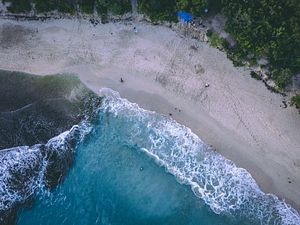The COVID-19 pandemic comes at a time when Australia must ensure it does not lose sight of its Pacific neighbors. The already fragile and vulnerable democracies of the Pacific are at risk of major disruptions to governance as result of COVID-19.
An opportunity has presented itself to Beijing to further strategic ambitions in the Pacific during this period. Over the past few months, the Australian government, a long-standing partner to Pacific Island Countries (PICs), has also stepped up to address the impending humanitarian and geopolitical crisis that the global pandemic will result in.
In an extraordinary summit in late March with G-20 leaders, Prime Minister Scott Morrison stated that “our Pacific island family must be a focus of international support.” The Australian government has moved to provide targeted development assistance to critical health services and support to buffer the immediate economic impacts of the pandemic.
This comes as the Chinese Communist Party’s propaganda machine is in overdrive and in many respects can be seen as doubling down during the global pandemic to further strategic ambitions.
Chinese embassies have moved quickly to supply large volumes of protective equipment and test kits. The exercise has been described by Richard McGregor of the Lowy Institute as a “good thing, but it also has a geopolitical aspect.”
The strategic contest in the Pacific has long been escalating. China’s use of diplomatic and economic statecraft had already begun to bear fruit, notably in pressuring Pacific nations to derecognize Taiwan as an independent nation.
China’s opaque assistance has often come in ways that traditional Western donors do not support. The use of regulatory lax loans, which has been called “debt trap diplomacy,” and strategic support to Pacific countries has been key. Often lacking in oversight and transparency, such practices have exposed these fragile democratic states to economic risk when they are unable to pay back debts, as well as increased susceptibility to corruption and influence.
The global pandemic has the potential to irrevocably cripple both the health services and the economies of Pacific island nations.
Papua New Guinea, the Pacific’s most populous country and Australia’s largest aid beneficiary, has already been teetering on the edge of a health crisis, only two years ago suffering from a resurgence of polio.
Last year, Tonga suffered from a major outbreak of measles that severely tested the country’s healthcare system. The epidemic spread to Samoa and Fiji, which joined Tonga in declaring states of emergency and requiring international support.
China’s ongoing global public relations exercise is looking to leverage the crisis to, first, remove any image of liability for the mismanagement of the pandemic, and second, exploit instability to further their geostrategic ambitions of aligning global interests toward China.
In early March, China moved swiftly to facilitate a video conference with all PICs. This videoconference was conducted alongside the creation of the China-Pacific Island Countries anti-COVID-19 Cooperation Fund. The Fund, worth $1.9 million, has provided Pacific island states with finances to purchase medical equipment from Chinese companies.
China’s diplomatic network through the Pacific produced many media statements attesting to the “role model” relationships that have developed between China and nations in the Pacific.
The brazen nature of the public relations exercise saw China’s ambassador to Vanuatu exchange a novelty-sized check with Vanuatu’s foreign minister.
China’s COVID-19 public relations push presents a major challenge for Australia, and the West broadly, in countering Chinese influence in the Pacific. This influence seeks to undermine and corrupt the vulnerable democratic institutions of the PICs for the benefit of a sinocentric realignment in China’s immediate neighborhood – long-term ambitions include a military base in the Pacific.
Prior to the pandemic, Australia was in the processes of instituting significant changes to its foreign policy approach in the Pacific. Reforms can be seen via the Pacific Step-up, which is framed as a deepening Australia’s engagement in the Pacific and the AU$2 billion Australian Infrastructure Financing Facility for the Pacific (AIFFP). The Australian government also recently announced a review of the aid budget to address “new and emerging priorities.”
However, the global pandemic has not only derailed plans but has also increased the stakes in the short term. Australian Foreign Minister Marise Payne flagged that Australia is assisting PICs with laboratories, medical equipment, health expertise, and public health information campaigns.
Australia has also moved to extend the visas for people on the Pacific Labor Scheme and Seasonal Worker Program, both of which are a key source of remittances for many in the Pacific.
When speaking to the Australian Broadcasting Corporation’s Pacific Beat, Minister for the Pacific and International Development Alex Hawke underscored the need to be sending high-quality aid to the Pacific as not to “add to the burdens in-country.” The thinly veiled swipe is a clear reference to the increasing reports globally, including in Australia, of poor quality and failing Chinese medical equipment exports, including faulty tests and protective equipment.
The post-COVID-19 geopolitical landscape will be substantially altered and may come with significant blowback for China as result of its behavior before, during, and after the crisis.
Tensions between the superpowers of the United States and China was already significantly impacting global trade and multilateral institutions. However, we may now see the global bifurcation of trade, technology, and institutions accelerate.
In the Pacific, Australia has a proud history of coming to support Pacific neighbors in times of need. While Hawke told the ABC’s Pacific Beat that Australia is not in competition with China to help countries in the Pacific, the reality is quite the opposite.
Philip Citowicki was an adviser to former Australian Foreign Minister Julie Bishop and a former Political Aide to Australia’s High Commissioner to the United Kingdom.

































